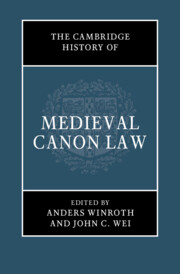Book contents
- The Cambridge History of Medieval Canon Law
- The Cambridge History of Medieval Canon Law
- Copyright page
- Contents
- Figures
- Maps
- Tables
- Contributors
- Acknowledgments
- Abbreviations
- Medieval Canon Law: Introduction
- Part I The History of Medieval Canon Law
- Part II The Sources and Dissemination of Medieval Canon Law
- 10 Theology and the Theological Sources of Canon Law
- 11 Church Councils
- 12 Decretals and Lawmaking
- 13 Roman Law: Symbiotic Companion and Servant of Canon Law
- 14 Law Schools and Legal Education
- 15 Local Knowledge of Canon Law, c. 1150–1250
- 16 Medieval Canon Law Manuscripts and Early Printed Books
- Part III Doctrine and Society
- Bibliography of Primary Sources
- Index
- References
13 - Roman Law: Symbiotic Companion and Servant of Canon Law
from Part II - The Sources and Dissemination of Medieval Canon Law
Published online by Cambridge University Press: 13 January 2022
- The Cambridge History of Medieval Canon Law
- The Cambridge History of Medieval Canon Law
- Copyright page
- Contents
- Figures
- Maps
- Tables
- Contributors
- Acknowledgments
- Abbreviations
- Medieval Canon Law: Introduction
- Part I The History of Medieval Canon Law
- Part II The Sources and Dissemination of Medieval Canon Law
- 10 Theology and the Theological Sources of Canon Law
- 11 Church Councils
- 12 Decretals and Lawmaking
- 13 Roman Law: Symbiotic Companion and Servant of Canon Law
- 14 Law Schools and Legal Education
- 15 Local Knowledge of Canon Law, c. 1150–1250
- 16 Medieval Canon Law Manuscripts and Early Printed Books
- Part III Doctrine and Society
- Bibliography of Primary Sources
- Index
- References
Summary
Modern legal systems are by and large very similar across most countries on earth. A widespread opinion ascribes this similarity to common heritage from Roman law, because this law (as codified under the Roman emperor Justinian 529–34 CE) was so useful. This is not, however, fully correct. Countries living under law originating in Europe share the same methods of legal argumentation, share many principles and categories, and also have a vast mass of procedural rules and substantive law in common. That conformity, however, did not come about by directly adopting legal rules or doctrines from Justinian. Instead, Christians all over Europe lived under the learned canon law of the Roman Church, whose lawyers from the late twelfth century adopted doctrines of medieval Roman law whenever there existed no appropriate ecclesiastic rules. Roman law regained importance in the Middle Ages through canon law; this is why Roman doctrines so often still survive.
Keywords
- Type
- Chapter
- Information
- The Cambridge History of Medieval Canon Law , pp. 230 - 261Publisher: Cambridge University PressPrint publication year: 2022
References
Select Bibliography
- 1
- Cited by



